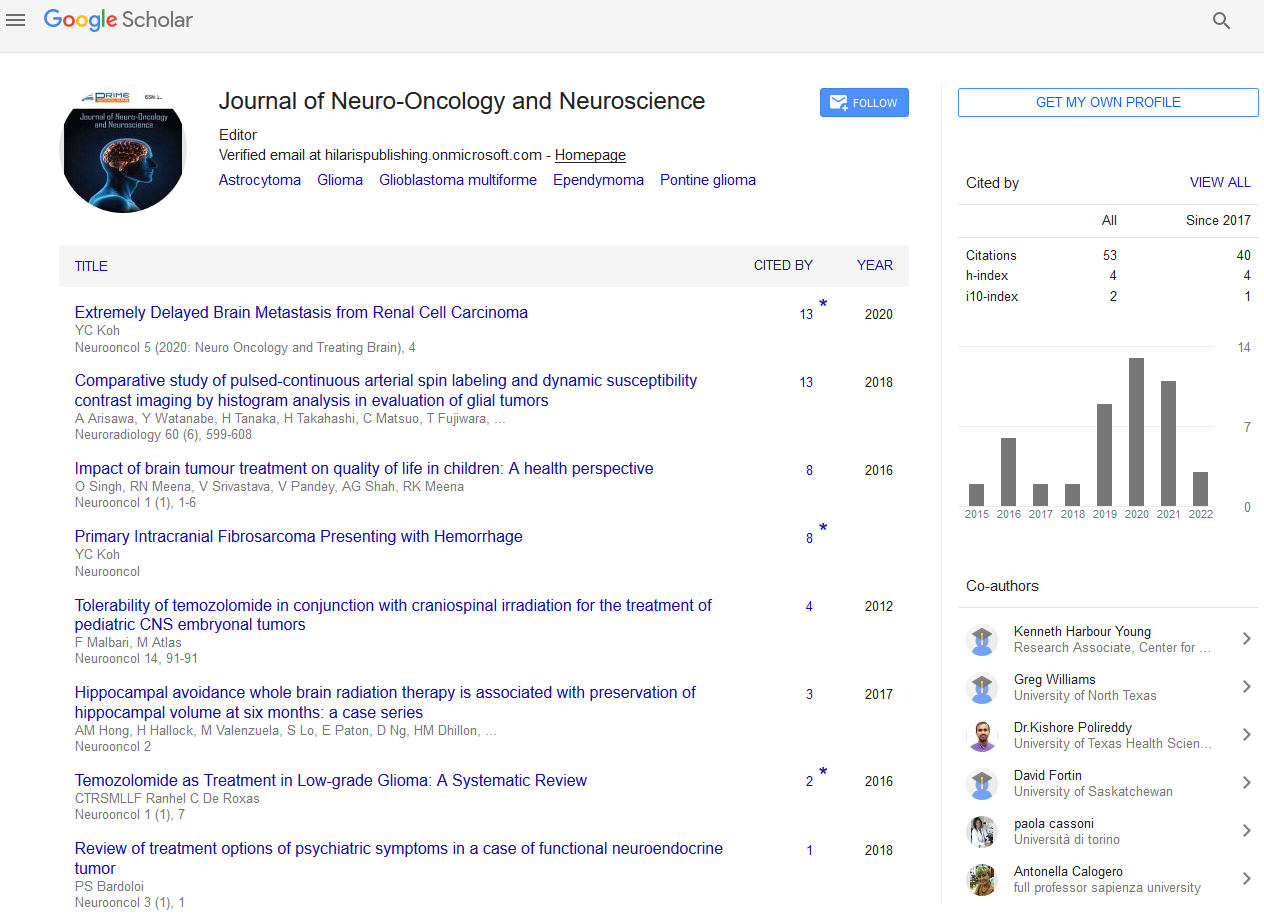Opinion - (2024) Volume 9, Issue 2
Advancements in The Role of Epigenetics in Brain Tumor Development
Anna Browne*
Department of Medical Oncology, Aarhus University, Denmark
*Correspondence:
Anna Browne,
Department of Medical Oncology, Aarhus University,
Denmark,
Email:
Received: 29-May-2024, Manuscript No. IPJNO-24-20746;
Editor assigned: 31-May-2024, Pre QC No. IPJNO-24-20746 (PQ);
Reviewed: 14-Jun-2024, QC No. IPJNO-24-20746;
Revised: 19-Jun-2024, Manuscript No. IPJNO-24-20746 (R);
Published:
26-Jun-2024, DOI: 10.21767/2572-0376.9.2.12
Introduction
Brain tumors, particularly gliomas, are among the most
challenging cancers to treat due to their complexity and the
brain’s sensitive environment. Recent advancements in the
field of epigenetics have provided new insights into brain tumor
development, offering potential pathways for novel therapies
and improved prognostic tools. This article explores the critical
role of epigenetics in brain tumor development and the latest
advancements that are reshaping our understanding and
approach to these malignancies. Epigenetics refers to heritable
changes in gene expression that do not involve alterations in
the DNA sequence itself. These changes are primarily mediated
through mechanisms such as DNA methylation, histone
modification, and non-coding RNAs. Epigenetic modifications
can regulate gene expression dynamically, allowing cells
to respond to various internal and external stimuli. In the
context of cancer, including brain tumors, aberrant epigenetic
modifications can activate oncogenes or silence tumor
suppressor genes, driving tumorigenesis. DNA methylation, the
addition of a methyl group to the DNA molecule, is one of the
most studied epigenetic mechanisms in brain tumors. Hyper
methylation of CpG islands in the promoter regions of tumor
suppressor genes can lead to their silencing, contributing to
tumor development. Conversely, global hypo methylation can
activate oncogenes and promote genomic instability.
Description
Advancements in DNA methylation profiling have enabled
the identification of specific methylation patterns associated
with different brain tumor subtypes. For instance, the O6-
methylguanine-DNA methyl transferase gene’s promoter
methylation status is a critical biomarker in glioblastoma,
predicting the response to alkylating agents like temozolomide.
Patients with a methylated MGMT promoter tend to have
better outcomes with this therapy. These modifications affect
chromatin structure and gene expression. In brain tumors,
abnormal histone modification patterns have been linked
to tumorigenesis. Recent research has highlighted the role
of histone mutations in pediatric high-grade gliomas. For
example, mutations in the histone H3 gene are prevalent in
diffuse intrinsic pontine gliomas and other midline gliomas.
These mutations result in altered chromatin states, leading
to the dysregulation of gene expression programs critical for
tumor development. Non-coding RNAs, including microRNAs
and long non-coding RNAs play significant roles in regulating
gene expression at the post-transcriptional level. Dysregulation
of non-coding RNAs is a hallmark of many cancers, including
brain tumors. Recent studies have identified specific miRNAs
and lncRNAs associated with brain tumor progression,
prognosis, and response to therapy. For instance, miR-21
is often overexpressed in glioblastoma and contributes to
tumor growth and resistance to apoptosis. Targeting such
non-coding RNAs represents a promising therapeutic strategy,
with efforts underway to develop miRNA mimics or inhibitors
that can restore normal gene expression patterns. The
growing understanding of epigenetic mechanisms in brain
tumors has spurred the development of epigenetic therapies.
HDAC inhibitors, DNA methyl transferase inhibitors, and
bromodomain and extra-terminal motif inhibitors are among
the epigenetic drugs being investigated for brain tumors.
Conclusion
The role of epigenetics in brain tumor development is a
rapidly evolving field, offering profound insights into the
molecular underpinnings of these malignancies. Advances
in understanding DNA methylation, histone modifications,
and non-coding RNAs have highlighted the complexity of
epigenetic regulation in brain tumors. These insights are paving
the way for innovative therapeutic approaches, including the
development of targeted epigenetic therapies. As research
progresses, the integration of epigenetic strategies into clinical
practice holds the promise of improving outcomes for patients
with brain tumors, ultimately transforming the landscape of
neuro-oncology.
Citation: Browne A (2024) Advancements in the Role of Epigenetics in Brain Tumor Development. Neurooncol. 9:12.
Copyright: © 2024 Browne A. This is an open-access article distributed under the terms of the Creative Commons Attribution License, which permits unrestricted use, distribution, and reproduction in any medium, provided the original author and source are credited.

